New semester, new fellows and new structure of the COPH
This is the semester of all things new for the USF College of Public Health.
The COPH welcomed 85 undergraduates, 213 masters and 29 doctoral students this fall semester representing more than 26 different states and 13 countries across each continent of the globe.
“It is my honor and privilege to welcome you to the best college of public health in the universe!” Dean Donna Petersen said during her address at orientation held Aug. 16 for graduate students.
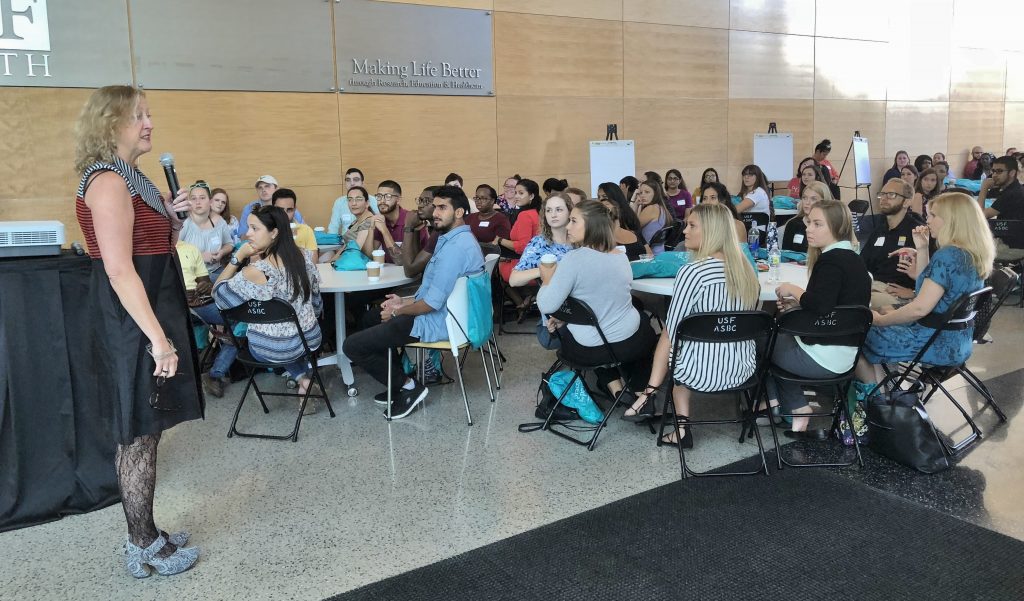
Dean Donna Petersen addresses graduate students at orientation for fall 2018. (Photo by Anna Mayor)
Her advice to students this semester—take advantage.
“Take advantage of everything we offer. You are here for such a short time. If there is a speaker that’s coming here to talk, go hear them. If there is a student organization, join them. If there is an opportunity to get engaged in the community, do that,” she said. “Take advantage of the staff and faculty. We are all here to help you achieve what you want to achieve.”
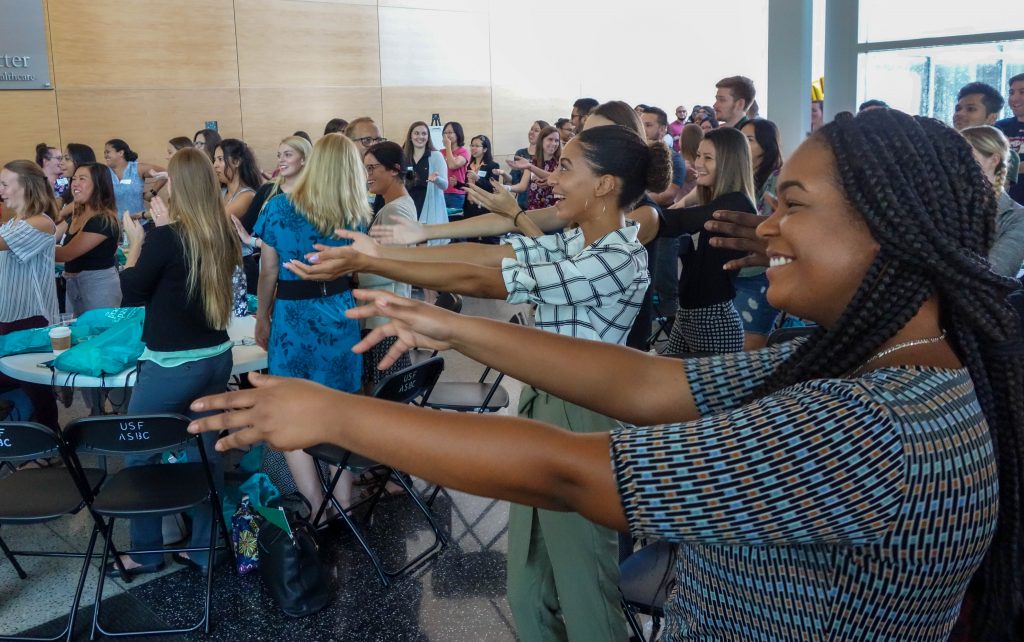
Dr. Anthony Masys’, associate professor of global health, invited graduate students to stand up and warm up with some creative dance to get their ‘creativity’ flowing. (Photo by Caitlin Keough)
Graduate students met in USF Health Center for Wellness, Engagement, Leadership and Learning (WELL) rotunda, followed by an informational expo and mixer with faculty at the COPH building.
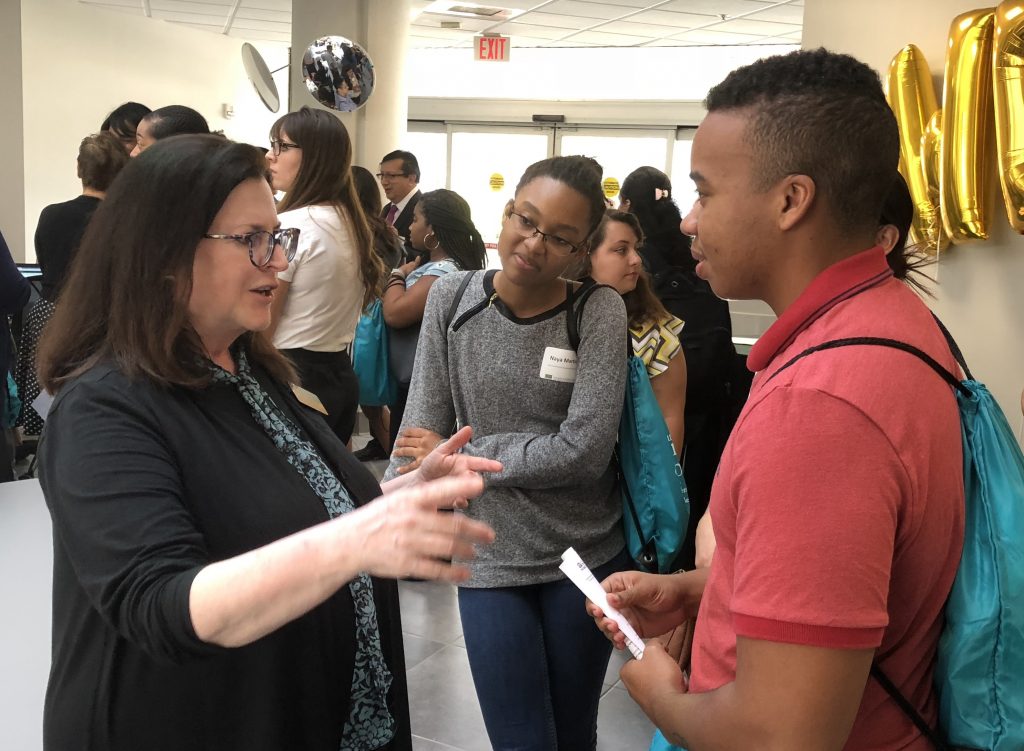
Dr. Ellen Daley, professor and associate dean of research and practice, speaks with incoming graduate students during the faculty and student mixer portion of orientation. (Photo by Anna Mayor)
“Get to know each other, we are delighted you are here and that you have chosen the USF College of Public Health. Meet each other,” stressed Dean Petersen. “These are your colleagues, these will be your professional colleagues for the rest of your lives. We think you have made an excellent choice.”
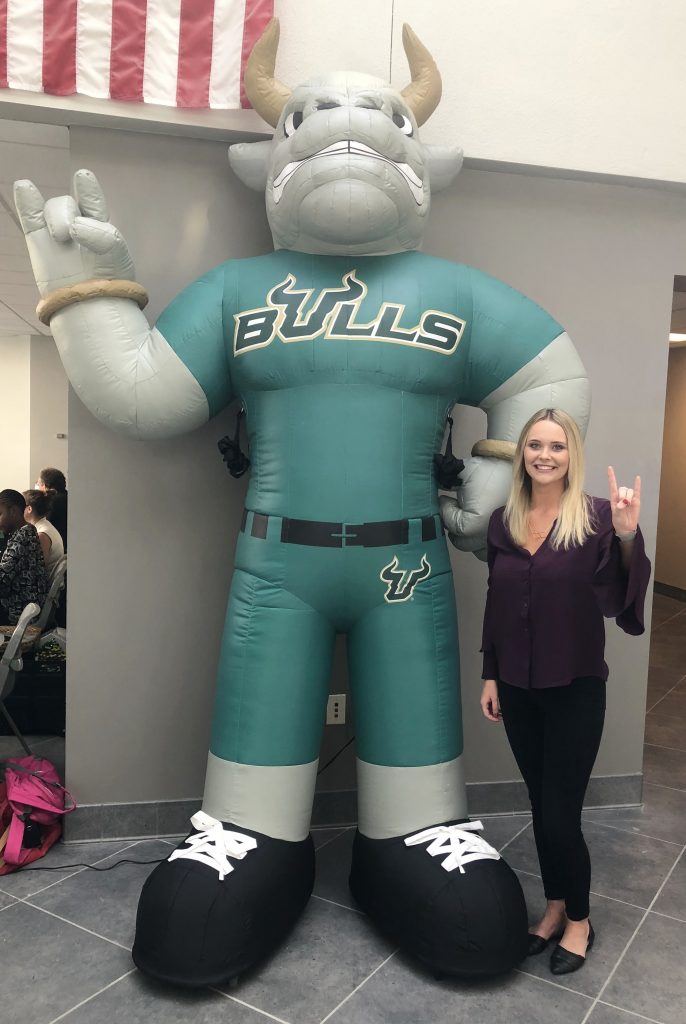
Graduate student Haley Tolbert poses with Rocky during the COPH orientation. (Photo by Anna Mayor)
Graduate student Haley Tolbert, originally from Valdosta, Ga., earned her undergraduate degree from Florida State University in marketing and management. She said she was looking to further her education in health administration, something not offered at FSU.
“I was doing research on what programs were the best in Florida and USF constantly came up and really exceeded my expectations so far,” Tolbert said. “I chose to come here also because Tampa is such a huge location, it’s so up-and-coming and has so many job opportunities. I’m excited.”
Undergraduates met Aug. 17 for orientation and took an in-depth tour of the COPH and USF WELL.
The average GPA of the 85 incoming undergraduates was 3.02 and included students from New York, Jamaica, Nigeria and the United Kingdom.
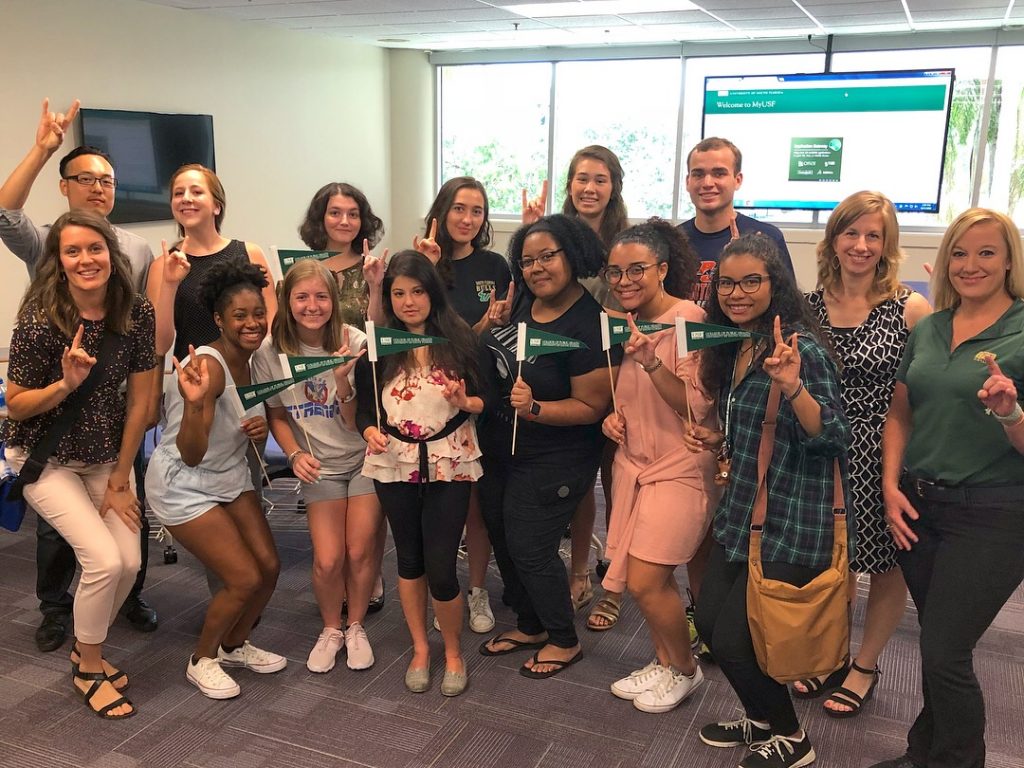
Undergraduate students show their COPH pride during orientation after a panel discussion with advisors and faculty. (Photo by Anna Mayor)
Anna Makenzie Wright, an undergraduate from Islamorada, Fla., on the Florida Keys, said it was a Google search that prompted her to apply.
“I searched for the best public health schools in Florida and USF COPH constantly came up,” she said. “I was amazed at how pretty the campus was and I was overwhelmed by how nice everyone was here.”
First cohort of Coverdell Fellows
The COPH also welcomed its first cohort of Paul D. Coverdell Fellows this semester, a graduate fellowship program awarding financial assistance to returning Peace Corps volunteers pursuing an MPH or MSPH degree. The fellowship also includes an internship in underserved communities in Tampa for two years.
Jianca Reid, a student in the global health practice concentration, served for more than two years in Thailand as a youth and development volunteer.
“I was considered exotic, so that was unique. I lived in rice patty fields and the city was within biking distance. I made friends with the locals; it was a great experience,” she said.
Reid, whose passion for service began as a member of AmeriCorps, said her service in Thailand included coding, leadership camps, teaching English and even teaching soccer.
“I love people,” she said. “I love kids and learning about different cultures. Every time I do different service work, it is so unique,” she said.
Reid, who earned her undergraduate degree from USF, credits her undergraduate professor Deidre Orriola for inspiring her to continue on in public health.
“When she was teaching my intro to public health class, I kept thinking she was so cool and after that I just dove into public health,” she said.
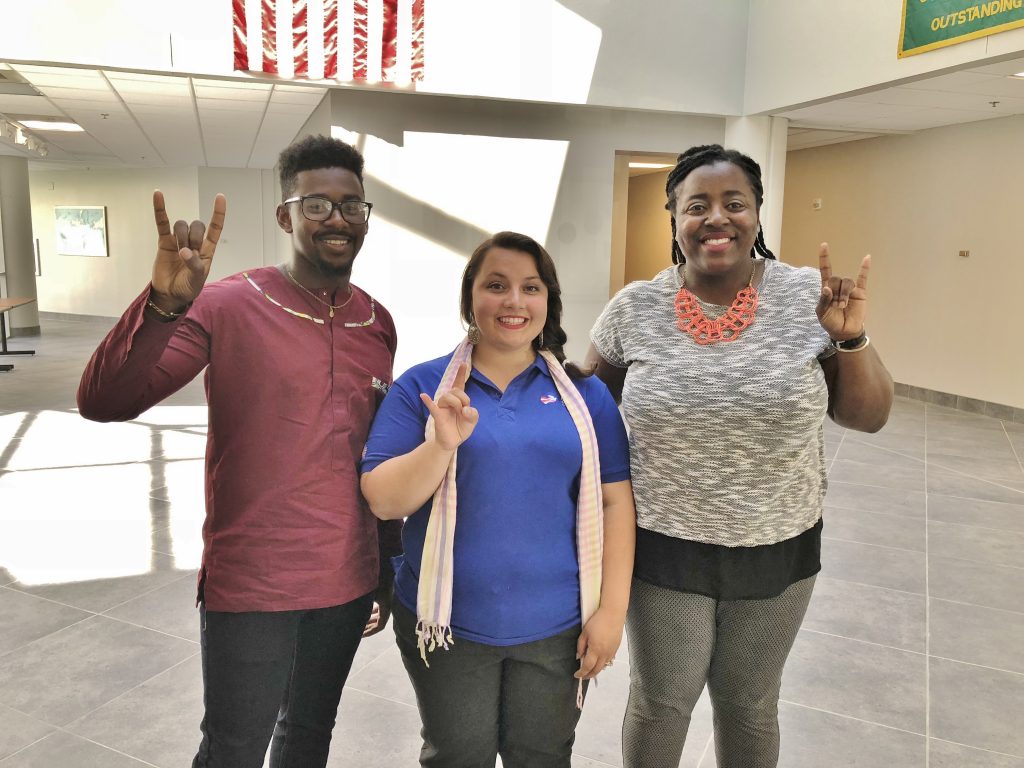
First cohort of Coverdell Fellows at the COPH (from left): Brian Richardson, Megan Montoya and Jianca Reid. (Photo by Anna Mayor)
For returned Peace Corps volunteer Brian Richardson, the passion for helping others began at home.
He served for some time in Mali as a water safety and hygiene volunteer and in Gambia as a health extension volunteer.
“My dad told me that before I could barely talk, I’ve always been trying to help people and I guess that’s never changed,” he said. “I grew up in Deerfield Beach in Broward County and in my neighborhood there were a lot of people from Mali. They told me about the issues in their country and communities and these were issues I studied in undergrad and I figure maybe there was a way I could go over there and help out.”
Richardson, who earned his undergraduate degree from Florida International University in recreation and sports management said he had no health knowledge before joining the Peace Corps.
“Once I was in Gambia, I saw a lot of bad issues and it killed me to see that type of stuff going on. I started to do more health work while I was there related to malaria and nutrition, and education in general, and that sparked my fire to pursue public health,” he said.
Richardson is earning his degree in the public health education concentration.
For Megan Montoya it’s mutual understanding that drove her to serve.
Montoya, who earned her undergraduate degree in psychology from the University of Utah is currently pursuing her MPH in epidemiology and global health.
She served in Cambodia for 12 months as a health extension volunteer, working out of a health center speaking to others on a variety of health topics ranging from prenatal health, vaccines and nutrition.
She also initiated a grant to build bathroom facilities in an elementary school, which inspired more water safety and hygiene projects.
“Resilience; making something out of nothing and empowering yourself and others, that’s the biggest thing I learned in the Peace Corps,” she said. “It’s mutual understanding. I can be teaching, but at the same time learning from the other culture and vice versa.”
For more information on becoming a Coverdell Fellow, students may visit the COPH’s Peace Corps Coverdell Fellows website.
Restructure of the COPH
On Aug. 8 the COPH officially adopted a new organizational structure removing the five department model and reorganizing into four strategic areas, which Dean Petersen says will allow for greater faculty collaboration.
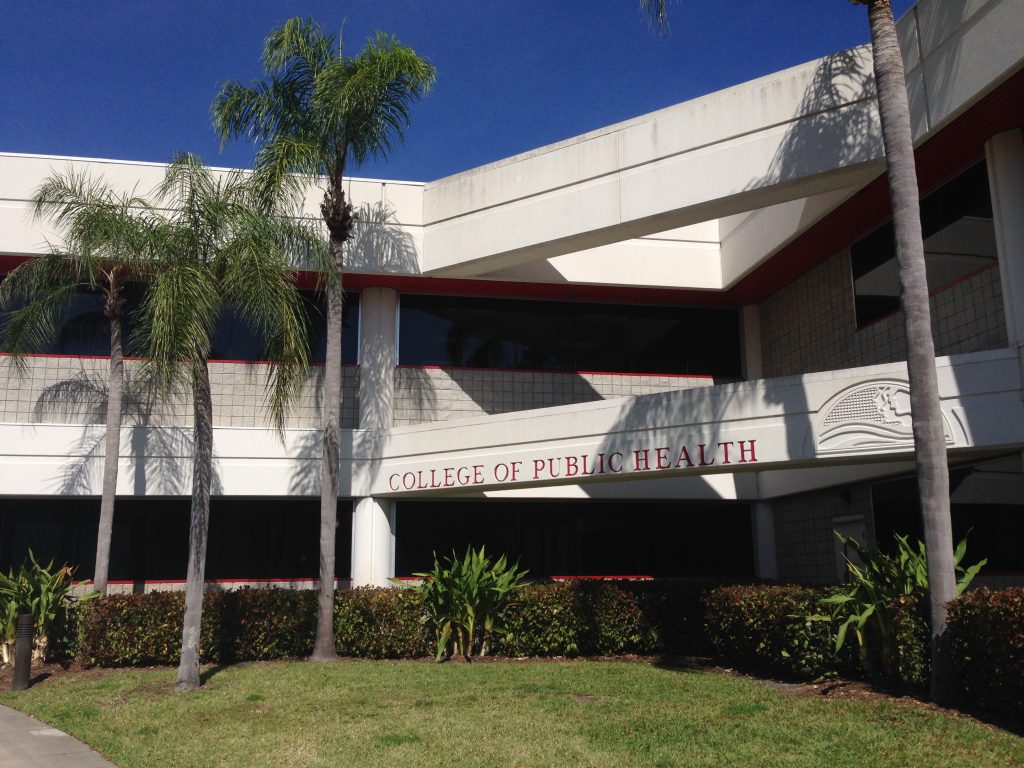
(Photo by Anna Mayor)
“What we have created is different ways to align ourselves in the spirit of faculty and college success,” she said.
According to Petersen, in 2011 ASPPH created the Framing the Future Taskforce to rethink education in public health.
“Things were heading away from the five core disciplines model,” she said. “In fact, this college, in 2012, started reframing the core curriculum in the MPH in light of these conversations.”
Petersen said this prompted her to think about how the department structure was impacting the COPH.
“At the end of the day, I still came down to the fact that we would be a stronger faculty and college if we were just one college,” she said.
Instead of departments, there are now four strategic areas at the COPH, each with their own strategic area leads and administrative approvers:
Policy, Practice and Leadership
Dr. Karen Liller, strategic area lead
Dr. Kay Perrin, administrative approver
Population Health Sciences
Dr. Russell Kirby, strategic area lead
Dr. Tricia Pennicook, administrative approver
Global and Planetary Health
Dr. Thomas Unnasch, strategic area lead
James Evans, administrative approver
Interdisciplinary Science and Practice
Dr. Anthony Masys, strategic area lead
Dr. Ellen Daley, administrative approver
Dean Petersen said she will conduct all faculty assignments and evaluations and assure equitable distribution of resources to support faculty success.
“Students apply to concentrations and we’ve identified the faculty affiliated with each one,” Petersen said. “The goal now is to encourage and support faculty working across disciplines and focus on strategy.”
The COPH has also moved toward a centralized service model for all administrative processes. The Business Operations Support Services team (BOSS), provides support to faculty and staff. They serve the entire COPH community and assist with a range of administrative needs from ordering office supplies to arranging travel.
BOSS staff include:
Pamela Mclean (CPH 2029)
Kristina Hamp (first floor of COPH)
Donna Rodandello (second floor of COPH)
Katherine Small (IDRB 311)
Sara de la Cantera (Chiles Center)
“We always want to be looking ahead and be as agile as we can,” Petersen said in regard to why the change was necessary. “This will enhance the student experience and facilitate faculty working strategically and working together.”
Story by Anna Mayor, USF College of Public Health
